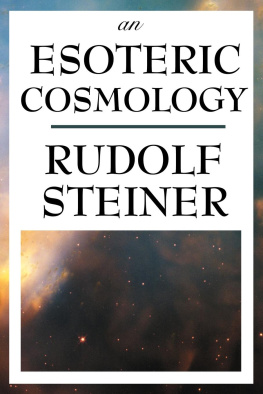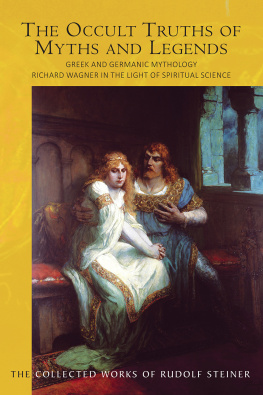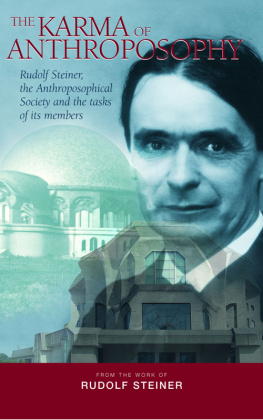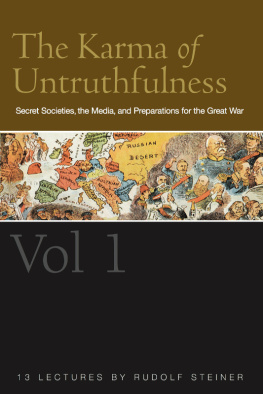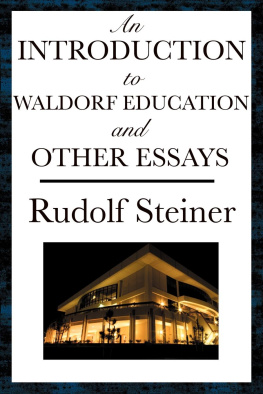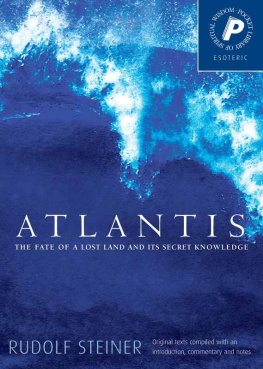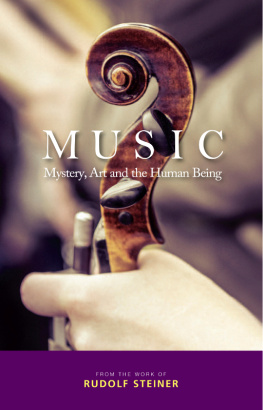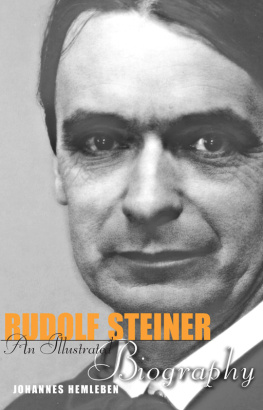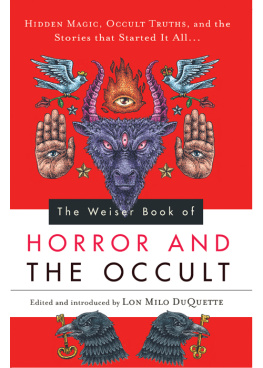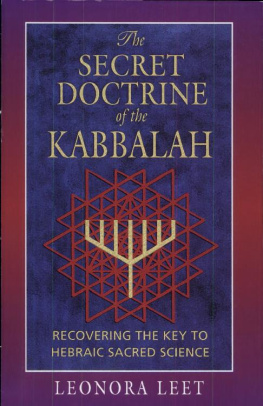An Esoteric Cosmology
Rudolf Steiner
Start Publishing LLC
Copyright 2012 by Start Publishing LLC
All rights reserved, including the right to reproduce this book or portions thereof in any form whatsoever.
First Start Publishing eBook edition October 2012
Start Publishing is a registered trademark of Start Publishing LLC
Manufactured in the United States of America
10 9 8 7 6 5 4 3 2 1
ISBN 978-1-62793-174-8
The Birth of the Intellect and the Mission of Christianity
It is only of recent times that the truths of occultism have been the subject of public lectures. Formerly, these truths were only revealed in secret societies, to those who had passed through certain degrees of initiation and had sworn to obey the laws of the Order through the whole of their life. Today, man is entering upon a very critical period. Occult truths are beginning to be disclosed to the public. In a matter of twenty years or so, a certain number of them will already be common knowledge. Why is this? The reason is that humanity is entering upon a new phase which it is the object of this lecture to explain.
In the Middle Ages, occult truths were known in the Rosicrucian Movement. But whenever they leaked out, they were either misunderstood or distorted. In the eighteenth century they entered upon a phase of much dilletantism and charlatanry and at the beginning of the nineteenth century they were put entirely in the background by the physical sciences. It is only in our day that they are beginning to re-emerge and in the coming centuries they will play an important part in the development of mankind. In order to understand this, we must glance at the centuries preceding the advent of Christianity and follow the progress that has been made.
It does not require any very profound knowledge to realise the difference between a man of pre-Christian times and a man of today. Although his scientific knowledge was far less, man of olden times had deeper feelings and intuitions. He lived more in the world beyond which he also perceived than in the world of sense. There were some who entered into direct and actual communication with the astral and spiritual world. In the Middle Ages, when earthly existence was by no means comfortable, man still lived with his head in the heavens. True, the mediaeval cities were somewhat primitive, but they were a far truer representation of man's inner world than the cities of today. Not only the cathedrals but the houses and porches with their symbols reminded men of their faith, their inner feelings, their aspirations, and the home of their soul. Today, we have knowledge of many, many things and the relations among human beings have multiplied ad infinitum. But we live in cities that are like deafening factories in awful Babels, with nothing to remind us of our inner world. Our communion with this inner world is not through contemplation but through books. We have passed from intuition into intellectualism.
To find the origin of the stream of intellectualism we must go back further than the Middle Ages. The epoch of the birth of human intellect, the period when this transformation took place, lies about a thousand years before the Christian era. It is the epoch of Thales, Pythagoras, Buddha. Then for the first time arose philosophy and science, that is to say truth presented to the reason in the form of logic. Before this age, truth presented itself in the form of religion, of revelation received by the teachers and accepted by the masses. In our times, truth passes into the individual intelligence and would fain be proved by argument, would like to have its own wings clipped.
What has happened in the inner nature of man to justify this transition of his consciousness from one plane to another, from the plane of intuition to that of logic? Here we touch upon one of the fundamental laws of history a law no longer recognised by contemporary thought. It is this: Humanity evolves in a way which enables the different elements and principles of man's being to unfold and develop in successive stages. What are these principles?
To begin with, man has a physical body in common with the mineral kingdom. The whole mineral world is found again in the chemistry of the body. He has an etheric body, which is, properly speaking, the vital principle within him. He has this etheric body in common with the plants. This principle engenders the process of nutrition and the forces of growth and re-production. Man has also an astral body in which feelings and sentiments, the power of enjoyment and of suffering are enkindled. He has the astral body in common with the animals.
Finally, there is a principle in man which cannot be spoken of as a body. It is his innermost essence, distinguishing him from all other entities, mineral, plant and animal. It is the self, the soul, the divine spark. The Hindus spoke of it as Manas; The Rosicrucians as the Inexpressible. A body, in effect, is only part and parcel of another body, but the self, the I of man exists in and by itself alone I am I. This principle is addressed by others as thou, or you; it cannot be confused with anything else in the universe. By virtue of this inexpressible, incommunicable self, man rises above all created things of the Earth, above the animals, indeed above all creation. And only through this principle can he commune with the Infinite Self, with God. That is why, at certain definite times, the officiating hierophant in the ancient Hebrew sanctuaries said to the High Priest: Shem-Ham-Phores, which means: What is his name (the name of God)? He-Vo-He, or in one word Jev or Joph, meaning God, Nature, Man; or again, the inexpressible I of man which is both human and divine.
These principles of man's being were laid down in remote ages of his vast evolutionary cycle but they only unfold slowly, one by one.
The special mission of the period which began about a thousand years before the Christian era has been to develop the human Ego in the intellectual sense. But above the intellectual plane there is the plane of Spirit. It is the world of Spirit to which man will attain in the centuries to come, and to which he will be wending his way from now onwards. The germs of this future development have been cast into the world by the Christ and by true Christianity.
Before speaking of this world of Spirit, we must understand one of the forces by means of which humanity en masse passed from the astral to the intellectual plane. It was by virtue of a new kind of marriage. In olden times, marriages were made in the bosom of the same tribe or of the same clan which was only an extension of the family. Sometimes, indeed, brothers and sisters married. Later on, men sought their wives outside the clan, the tribe, the civic community. The beloved became the stranger, the unknown. Love which in days of yore had been merely a natural and social function became personal desire, and marriage a matter of free choice. This is indicated in certain Greek myths like that of the rape of Helen and again in the Scandinavian and Germanic myths of Sigurd and Gudrun. Love becomes an adventure, woman a conquest from afar.
This change from patriarchial marriage to free marriage corresponds to the new development of man's intellectual faculties, of the Ego. There is a temporary eclipse of the astral faculties of vision and the power of reading directly in the astral and spiritual world faculties which are included in ordinary speech under the name of inspiration.
Let us now turn to Christianity. The brotherhood of man and the cult of the One God are certainly features of it but they only represent the external, social aspect, not the inner, spiritual reality. The new, mysterious and transcendental element in Christianity is that it creates divine Love, the power which transforms man from within, the leaven by which the whole world is raised. Christ came to say: If you leave not mother, wife and your own body, you cannot be my disciple

